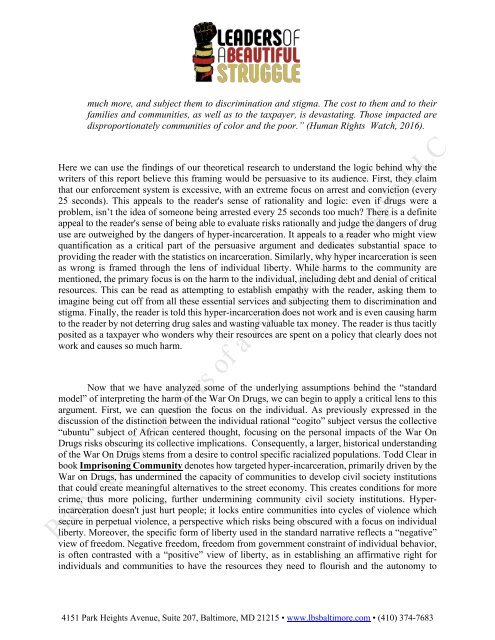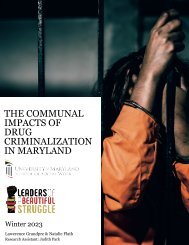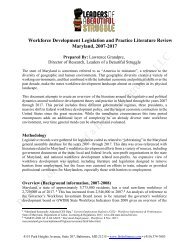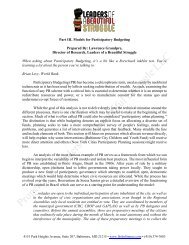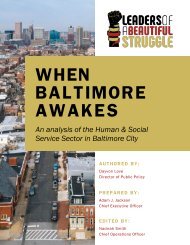Drug Decriminalization in Maryland Through an African Centered Research Paradigm- Analysis and Recommendations
This document offers guidance for theorizing questions related to a proposed research project purposed to advance drug decriminalization in Maryland.
This document offers guidance for theorizing questions related to a proposed research project purposed to advance drug decriminalization in Maryland.
- No tags were found...
You also want an ePaper? Increase the reach of your titles
YUMPU automatically turns print PDFs into web optimized ePapers that Google loves.
much more, <strong>an</strong>d subject them to discrim<strong>in</strong>ation <strong>an</strong>d stigma. The cost to them <strong>an</strong>d to their<br />
families <strong>an</strong>d communities, as well as to the taxpayer, is devastat<strong>in</strong>g. Those impacted are<br />
disproportionately communities of color <strong>an</strong>d the poor.” (Hum<strong>an</strong> Rights Watch, 2016).<br />
Here we c<strong>an</strong> use the f<strong>in</strong>d<strong>in</strong>gs of our theoretical research to underst<strong>an</strong>d the logic beh<strong>in</strong>d why the<br />
writers of this report believe this fram<strong>in</strong>g would be persuasive to its audience. First, they claim<br />
that our enforcement system is excessive, with <strong>an</strong> extreme focus on arrest <strong>an</strong>d conviction (every<br />
25 seconds). This appeals to the reader's sense of rationality <strong>an</strong>d logic: even if drugs were a<br />
problem, isn’t the idea of someone be<strong>in</strong>g arrested every 25 seconds too much? There is a def<strong>in</strong>ite<br />
appeal to the reader's sense of be<strong>in</strong>g able to evaluate risks rationally <strong>an</strong>d judge the d<strong>an</strong>gers of drug<br />
use are outweighed by the d<strong>an</strong>gers of hyper-<strong>in</strong>carceration. It appeals to a reader who might view<br />
qu<strong>an</strong>tification as a critical part of the persuasive argument <strong>an</strong>d dedicates subst<strong>an</strong>tial space to<br />
provid<strong>in</strong>g the reader with the statistics on <strong>in</strong>carceration. Similarly, why hyper <strong>in</strong>carceration is seen<br />
as wrong is framed through the lens of <strong>in</strong>dividual liberty. While harms to the community are<br />
mentioned, the primary focus is on the harm to the <strong>in</strong>dividual, <strong>in</strong>clud<strong>in</strong>g debt <strong>an</strong>d denial of critical<br />
resources. This c<strong>an</strong> be read as attempt<strong>in</strong>g to establish empathy with the reader, ask<strong>in</strong>g them to<br />
imag<strong>in</strong>e be<strong>in</strong>g cut off from all these essential services <strong>an</strong>d subject<strong>in</strong>g them to discrim<strong>in</strong>ation <strong>an</strong>d<br />
stigma. F<strong>in</strong>ally, the reader is told this hyper-<strong>in</strong>carceration does not work <strong>an</strong>d is even caus<strong>in</strong>g harm<br />
to the reader by not deterr<strong>in</strong>g drug sales <strong>an</strong>d wast<strong>in</strong>g valuable tax money. The reader is thus tacitly<br />
posited as a taxpayer who wonders why their resources are spent on a policy that clearly does not<br />
work <strong>an</strong>d causes so much harm.<br />
Now that we have <strong>an</strong>alyzed some of the underly<strong>in</strong>g assumptions beh<strong>in</strong>d the “st<strong>an</strong>dard<br />
model” of <strong>in</strong>terpret<strong>in</strong>g the harm of the War On <strong>Drug</strong>s, we c<strong>an</strong> beg<strong>in</strong> to apply a critical lens to this<br />
argument. First, we c<strong>an</strong> question the focus on the <strong>in</strong>dividual. As previously expressed <strong>in</strong> the<br />
discussion of the dist<strong>in</strong>ction between the <strong>in</strong>dividual rational “cogito” subject versus the collective<br />
“ubuntu” subject of Afric<strong>an</strong> centered thought, focus<strong>in</strong>g on the personal impacts of the War On<br />
<strong>Drug</strong>s risks obscur<strong>in</strong>g its collective implications. Consequently, a larger, historical underst<strong>an</strong>d<strong>in</strong>g<br />
of the War On <strong>Drug</strong>s stems from a desire to control specific racialized populations. Todd Clear <strong>in</strong><br />
book Imprison<strong>in</strong>g Community denotes how targeted hyper-<strong>in</strong>carceration, primarily driven by the<br />
War on <strong>Drug</strong>s, has underm<strong>in</strong>ed the capacity of communities to develop civil society <strong>in</strong>stitutions<br />
that could create me<strong>an</strong><strong>in</strong>gful alternatives to the street economy. This creates conditions for more<br />
crime, thus more polic<strong>in</strong>g, further underm<strong>in</strong><strong>in</strong>g community civil society <strong>in</strong>stitutions. Hyper<strong>in</strong>carceration<br />
doesn't just hurt people; it locks entire communities <strong>in</strong>to cycles of violence which<br />
secure <strong>in</strong> perpetual violence, a perspective which risks be<strong>in</strong>g obscured with a focus on <strong>in</strong>dividual<br />
liberty. Moreover, the specific form of liberty used <strong>in</strong> the st<strong>an</strong>dard narrative reflects a “negative”<br />
view of freedom. Negative freedom, freedom from government constra<strong>in</strong>t of <strong>in</strong>dividual behavior,<br />
is often contrasted with a “positive” view of liberty, as <strong>in</strong> establish<strong>in</strong>g <strong>an</strong> affirmative right for<br />
<strong>in</strong>dividuals <strong>an</strong>d communities to have the resources they need to flourish <strong>an</strong>d the autonomy to<br />
4151 Park Heights Avenue, Suite 207, Baltimore, MD 21215 • www.lbsbaltimore.com • (410) 374-7683


